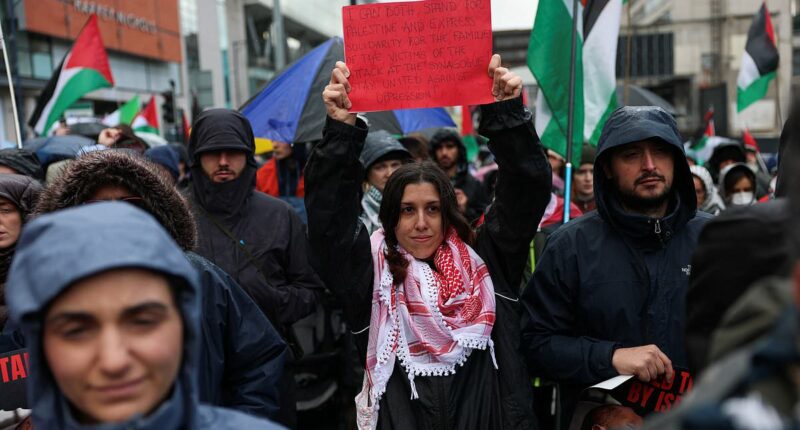Share this @internewscast.com
Police are to be granted new powers to limit pro-Palestine protests following the Home Secretary’s acknowledgment that British Jews are ‘justified’ in feeling let down by Labour.
Shabana Mahmood announced that chief constables would be empowered to assess the effects of ongoing demonstrations when determining whether they should proceed.
A change in the law will allow the police to require organisers to reroute planned marches and, in some cases, even cancel them.
The move was given a cautious welcome by Jewish leaders but triggered alarm from civil liberties campaigners.
Yesterday, Ms. Mahmood recognized that many Jews were dissatisfied with the Government’s delayed response to the wave of pro-Palestinian marches, which have frequently occurred in numerous cities since the October 7 attacks by Hamas.
She stood alongside Deputy Prime Minister David Lammy on Friday, during which he was interrupted by hecklers at a vigil for last week’s synagogue attack victims in Manchester.
Ms Mahmood told the BBC that people were ‘justified in asking for more from their government’.
She said repeated large-scale protests had caused ‘considerable fear’ for the Jewish community.

Police are to be granted new powers to limit pro-Palestine protests, following the Home Secretary’s admission that British Jews are ‘justified’ in feeling let down by Labour. Pictured: Participants in a demonstration organized by GM Friends of Palestine at Manchester Cathedral on Saturday.

Shabana Mahmood announced that chief constables would be given the authority to assess the impact of repeated demonstrations when determining whether they should proceed.

A change in the law will allow the police to require organisers to reroute planned marches and, in some cases, even cancel them. Above, people stage a protest to demand the British government to lift its ban on Palestine Action in Trafalgar Square on Saturday
The Home Secretary said the terror attack in Manchester showed ‘there is a problem’ with integration in the UK.
She added: ‘I am very worried about the state of community relations in our country’.
Organisers who breach those conditions could face up to six months’ imprisonment, a fine of up to £2,500, or both. Participants may also face a fine of up to £2,500.
The changes will be brought forward as an amendment to the Government’s Crime and Policing Bill, published in March, which is now going through the House of Lords.
Ministers had appealed for pro-Palestine campaigners to cancel planned demonstrations at the weekend in the wake of the attack by Jihad Al-Shamie on the Heaton Park synagogue on Thursday. But organisers ignored the request.
Speaking at an event to mark the second anniversary of the October 7 attacks, Phil Rosenberg, president of the Board of Deputies of British Jews, said some pro-Palestine marchers had been ‘almost gloating’ over the Manchester attacks.
Ms Mahmood said: ‘The right to protest is a fundamental freedom in our country. However, this freedom must be balanced with the freedom of their neighbours to live their lives without fear.
Large, repeated protests can leave sections of our country, particularly religious communities, feeling unsafe, intimidated and scared to leave their homes.
‘This has been evident in relation to the considerable fear within the Jewish community, which has been expressed to me on many occasions in these recent difficult days.’

Ms Mahmod said repeated large-scale protests had caused ‘considerable fear’ for the Jewish community. Pictured: A protester is escorted by police at a ‘Lift the ban’ protest by pro-Palestine group ‘Defend our Juries’ Pro-Palestine march in London on October 4
Sources said senior police officers would ‘apply their judgement’ to consider the frequency of protests and their ‘impact in particular areas’ or on ‘particular communities’ when they decide whether to impose the new restrictions.
Successive protests on the same issue could be covered, even if organised by different groups, it is understood.
In a letter to chief constables, Ms Mahmood said the changes ‘allow more flexibility to prevent disruptive protests from attending the same location and instruct organisers to move to a different site.’
However, the new powers could face legal challenges. Former Conservative Home Secretary Suella Braverman attempted to change the law to allow police to consider the ‘cumulative impact’ of protests in 2023.
The measures were declared unlawful by the High Court and that ruling was upheld by the Court of Appeal in May this year.
Lord Walney, the government’s former independent adviser on tackling political violence, welcomed the move but urged ministers to go further by making it easier for police to ban repeated marches outright.
Civil liberties campaigners raised concerns about the plans. Silkie Carlo, of campaign group Big Brother Watch, said it was ‘alarming that Starmer’s government is seeking to put even more restrictions on our cherished right to protest’.
She added: ‘For the government to mount this new attack on protest at a time when many thousands of people on the Right and Left of politics are exercising their freedom to assemble appears like a cynical attempt to suppress dissent.’
Defend Our Juries, which has organised protests against the prohibition of activist group Palestine Action, at which hundreds have been arrested, said it would carry out a ‘major escalation’ in response to the new policy.

















